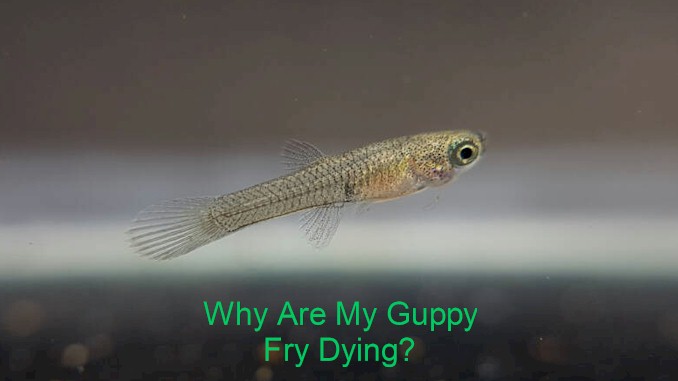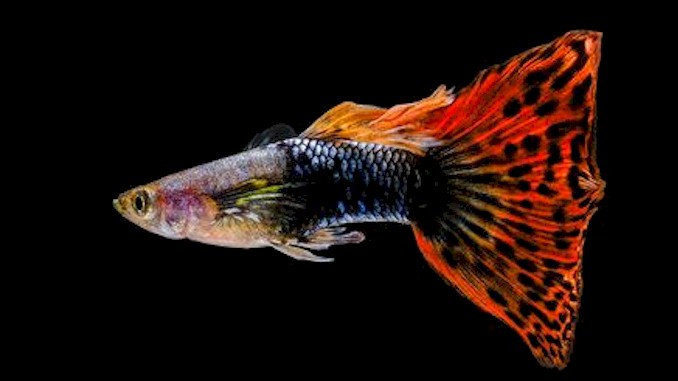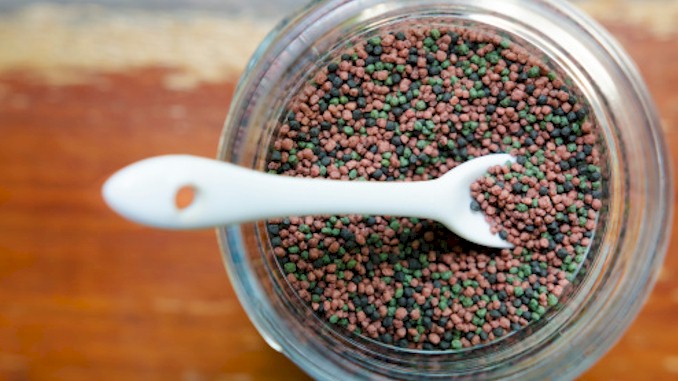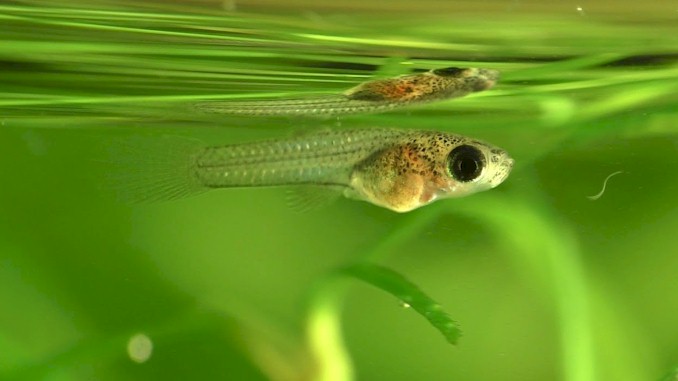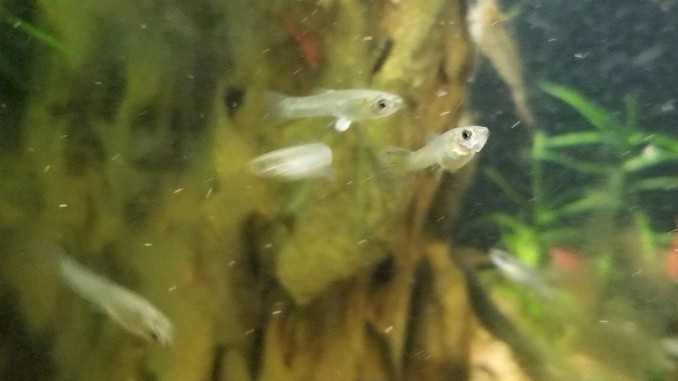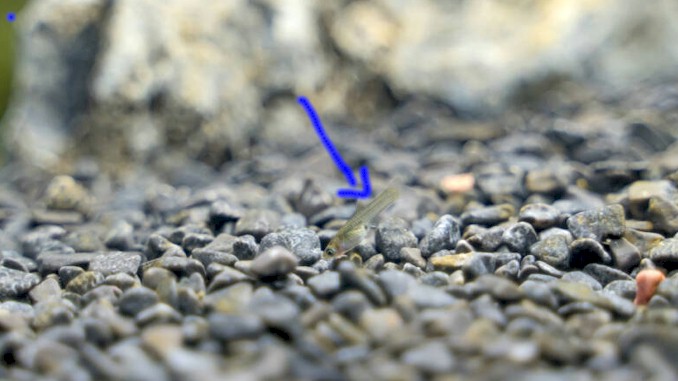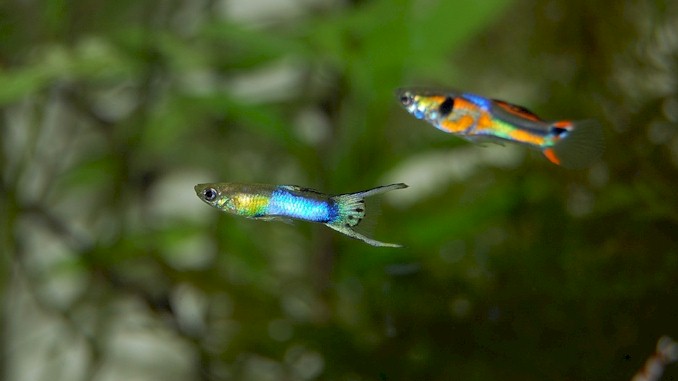Guppy Fry Dying? Here are 9 Ways to Keep Them Alive
If you are a guppy lover, you probably know how rewarding it is to breed these colorful and lively fish. But you may also have experienced the frustration of seeing your guppy fry die for no apparent reason. Why do guppy fry keep dying? And what can you do to prevent it? In this blog post, I will share with you some of the most common causes of guppy fry mortality and how to avoid them. I have been keeping and breeding guppies for over 10 years, and I have learned a lot from my successes and failures. I hope that by reading this post, you will be able to raise healthy and happy guppy fry that will grow into beautiful adults.
The main reason why guppy fry keep dying is cannibalism. The other most common reasons include poor water quality, overfeeding, and inadequate feeding. Additionally, newborn guppies are susceptible to diseases and may suffer from genetic defects that can result in mortality.
So you know some common reasons that could cause your guppy fry to die now, and you want to know more about the reasons so you can take appropriate action. Don’t worry, I have provided all that you need in this article. Read on to find out:
What Is the Reason Behind Guppy Fry Dying? Understanding the Common Factors
Guppy fry are the offspring of guppy fish, which are one of the most popular and easy-to-breed aquarium fish. However, guppy fry are also very fragile and vulnerable to many threats that can cause their death. In this section, we will explore some of the common factors that can lead to guppy fry dying, and how you can prevent or minimize them.
1. Cannibalism
One of the most common causes of guppy fry death is cannibalism. Adult guppies, including their parents, will eat any fry that they can catch. This is a natural instinct that helps them survive in the wild, where food is scarce and predators are abundant. However, in a home aquarium, this behavior can decimate your guppy population.
To prevent cannibalism, you need to separate the fry from the adults as soon as possible. You can use a breeding box or a net breeder to isolate the pregnant female before she gives birth. I provide the link to the product on Amazon, you can click it to get details. These devices allow water flow but prevent adult fish from reaching the fry. Alternatively, you can use a separate tank for breeding and raising guppy fry.
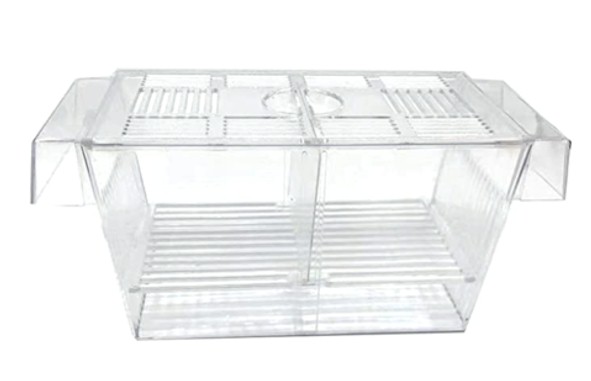
Fish Breeding Box Tank For Guppy
If you decide to keep your fry in the same tank as adults, you need to provide plenty of hiding places for them to escape predation. You can use live or artificial plants such as java moss or hornwort that create dense cover for the fry. You can also use rocks or driftwood that create caves and crevices for them to hide.
2. Poor Water Conditions
One of the main reasons why guppy fry die is poor water conditions. Guppy fry are very sensitive to changes in water parameters, such as temperature, pH, hardness, ammonia, nitrite, nitrate, and chlorine. If these parameters are not optimal for guppies, the fry may become stressed and susceptible to diseases.
To maintain good water conditions for guppy fry, you need to perform regular water changes, use a filter, and avoid overfeeding your fish. You also need to use a water conditioner to neutralize any chlorine or chloramine present in tap water. Ideally, you should test your water regularly with a test kit like the one I place below to monitor the levels of ammonia, nitrite, nitrate, pH, and hardness.
The optimal water conditions for guppy fry are:
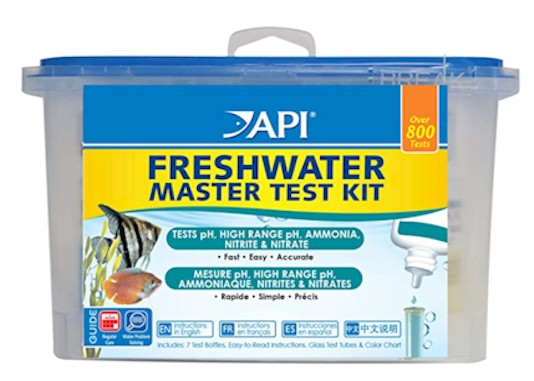
API Freshwater Master Test Kit
3. Not Enough Oxygen
Another reason why guppy fry die is not enough oxygen in the water. Oxygen is essential for the respiration and metabolism of fish. If the oxygen level is too low, the fry may suffocate and die. Low oxygen levels can be caused by several factors, such as:
- High temperature: Higher temperature reduces the amount of dissolved oxygen in the water.
- Overstocking: Too many fish in a tank can deplete the oxygen supply faster than it can be replenished.
- Overfeeding: Excess food can rot and produce ammonia, which consumes oxygen during its breakdown by bacteria.
- Lack of surface agitation: Surface agitation helps oxygenate the water by creating bubbles and ripples.
- Lack of plants: Plants produce oxygen during photosynthesis and help balance the carbon dioxide level in the water.
To ensure enough oxygen for guppy fry, you need to avoid these factors and provide adequate aeration for your tank. You can use an air pump with an air stone or a sponge filter to create bubbles that increase oxygen diffusion. I provide the links below to them on Amazon, and you can click to get more details. You can also add live plants that produce oxygen during daylight hours. However, be careful not to add too many plants that may consume oxygen at night.
Here is a link to amazon to a great air stone:
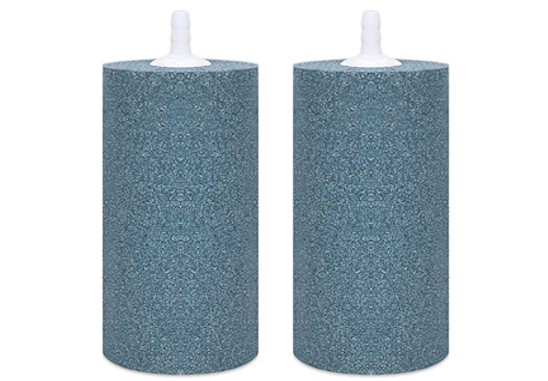
VIVOSUN Air Stone
Get the sponge type. It is worth noting that a fry tank doesn’t need a filter. If you don’t know how to identify the right filter for your fry, don’t bother getting one. If you do want to get one, below is a link to amazon to a great sponge filter:
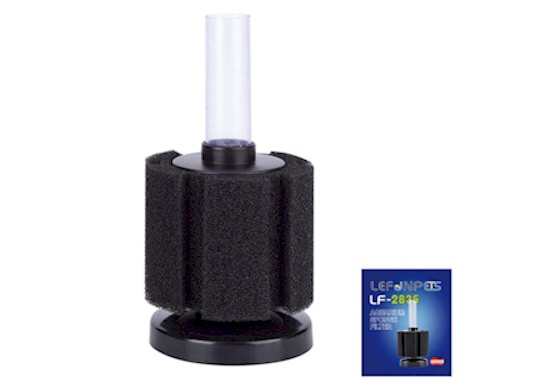
Sponge Filter For Fish Fry
If you notice your fish frequently opening and closing their mouth, it’s a clear indication that there is not enough oxygen, I strongly encourage you to read my comprehensive article on this subject. In it, I provide a step-by-step guide on what you should do to correct the problem before it becomes too severe.
4. Inadequate Temperature
Another factor that can affect guppy fry survival is inadequate temperature. Guppy fry require warm water with a consistent temperature between 78-82°F. Any fluctuations in temperature can have a significant impact on their growth and health.
To maintain a stable temperature for guppy fry, you need to invest in a reliable aquarium heater(click here to read the article on this website for more details) and thermometer. You should also avoid placing your tank near windows or vents that may cause sudden changes in temperature due to sunlight or drafts.
5. High Chlorine Concentrations
Another reason why guppy fry die is high chlorine concentrations in the water. Chlorine is a chemical that is added to tap water to kill harmful bacteria and parasites. However, chlorine is also toxic to fish and can damage their gills and skin. Guppy fry are especially sensitive to chlorine because they have a large surface area to volume ratio.
To avoid high chlorine concentrations for guppy fry, you need to use a water conditioner that neutralizes chlorine and chloramine every time you add tap water to your tank. You should also let the tap water sit for 24 hours before adding it to your tank, as this will allow some of the chlorine to evaporate. However, this method may not work for chloramine, which is a more stable compound of chlorine and ammonia.
6. Overcrowded Fish Tank
Another factor that can cause guppy fry dying is an overcrowded fish tank. An overcrowded tank can have several negative effects on guppy fry, such as:
- Reduced oxygen levels: Guppies need oxygen to thrive. If the tank is overstocked with unwanted guppy fry, it will lead to reduced oxygen levels. Guppy fry are especially vulnerable to low oxygen levels because they have a high metabolic rate and need more oxygen than adults. If the oxygen levels are low, your guppy fry will be prone to diseases and suffocation.
- Increased waste production: More fish means more waste. Waste products such as ammonia, nitrite, and nitrate can accumulate in the water and create toxic conditions for guppy fry. These toxins can damage their gills, skin, and organs, and cause stress and death.
- Increased competition: More fish also means more competition for food and space. Guppy fry may not get enough food or hiding places if they have to compete with adult fish or other fry. This can lead to malnutrition, stunted growth, aggression, and predation.
To avoid overcrowding your fish tank, you need to control the guppy population by separating males and females, selling or giving away excess fry, or introducing predators that will eat some of the fry. You also need to provide adequate filtration, aeration, and water changes to keep the water quality high.
7. Guppy Diseases
Another common reason why guppy fry die is that they contract various diseases that affect their health and well-being. Guppies are susceptible to many diseases and parasites that can be transmitted by other fish, water, food, or equipment. Some of the most common diseases that can kill guppy fry are:
- Ich/White Spot Disease: This is a parasitic disease that causes small white spots to appear on the body and gills of the fish. The parasites irritate the skin and reduce the respiratory function and oxygen intake of the fish. The fish may also lose their appetite and rub their body against objects. This disease is caused by a protozoan called Ichthyophthirius multifiliis, which thrives in poor water quality and temperature fluctuations.
- Dropsy: This is a bacterial disease that causes fluid accumulation in the body cavity of the fish. The fish may have a swollen belly, protruding scales, sunken eyes, and no appetite. This disease is caused by various bacteria that infect the internal organs of the fish, especially the liver and kidneys. The bacteria may enter the fish through wounds, food, or water.
- Swim Bladder Disease: This is a disorder that affects the swim bladder of the fish, which is an organ that helps them maintain their buoyancy and balance in the water. The fish may have difficulty swimming, floating upside down, sinking to the bottom, or staying at the surface. This disorder can be caused by various factors, such as overfeeding, constipation, infection, injury, or genetic defects.
- Fin Rot: This is a bacterial or fungal disease that causes the fins and tail of the fish to rot away. The fins may appear frayed, torn, discolored, or inflamed. The fish may also lose their appetite and become lethargic. This disease is caused by various bacteria or fungi that infect the fin tissue of the fish. The infection may be triggered by poor water quality, stress, injury, or parasites.
- Fungus: This is a fungal disease that causes cotton-like growths to appear on the skin, mouth, gills, or eyes of the fish. The fungus may also invade the internal organs of the fish and cause systemic infections. The fish may also lose their appetite and become lethargic. This disease is caused by various fungi that grow on dead or decaying organic matter in the water. The fungus may infect the fish through wounds, stress, or poor water quality.
These are some of the most common diseases that can cause guppy fry mortality. By recognizing their symptoms and causes, you can take appropriate measures to treat them and prevent them from spreading to other fish. Some of the general steps you can take to cure your guppy fry from diseases are:
- Isolate them in a quarantine tank with clean and conditioned water.
- Add aquarium salt (as per expert’s advice) to help them heal and reduce stress.
- Use medication (such as formalin, malachite green, antibiotics) to kill the pathogens (as per expert’s advice).
- Perform frequent water changes (at least 25% every day) to remove any toxins or waste from the water.
- Monitor their condition closely and observe any signs of improvement or deterioration.
By following these steps diligently and carefully, you can increase your chances of saving your guppy fry from diseases and restoring their health and happiness.
When you think about use medication, I recommend that you can use API General Cure, Ich-X, and Mardel Maracyn 2 together at the same time, just keep in mind that you will use the right dosage for your tank size. That way, you can get rid of most of the bacterial infections, fungal infections, internal parasites and external parasite.
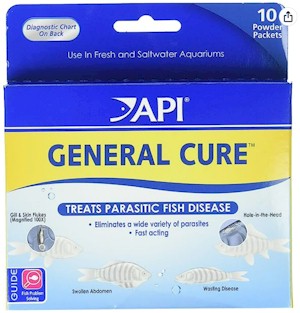
API General Cure
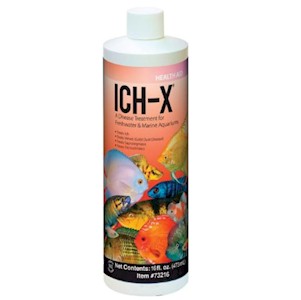
ICH-X
8. Stressed Females
Another factor that can cause guppy fry dying is stressed females. Female guppies can experience stress during pregnancy and birth, which can affect their health and the health of their fry. Some of the causes and effects of stress in female guppies are:
- Fry get stuck in the birth canal due to a deformity or an overdue pregnancy. Stress can prevent female guppies from releasing their fry, which can result in complications and death for both the mother and the fry.
- The female becomes stressed out because she has been moved or handled in a way to induce stress. This can lead to miscarriage or spontaneous abortion, where the female reabsorbs the fry and turns them back into eggs.
- The female becomes stressed out because of poor water quality, overcrowding, aggressive tank mates, or inadequate temperature. This can weaken her immune system and make her more prone to diseases and infections.
- The female becomes stressed out because of lack of food or improper diet. This can affect her nutrition and energy levels, which can affect her ability to produce healthy fry.
To prevent stress in female guppies, you need to provide them with optimal conditions for breeding and birthing. You need to separate them from male guppies and other fish that may harass them. You need to keep them in clean water with stable parameters and temperature. You need to feed them well with a variety of foods, especially live foods that are rich in protein. You also need to avoid moving or handling them unnecessarily, especially when they are close to giving birth.
9. Not feeding you guppy fry properly
Another factor that can cause guppy fry dying is not feeding them properly. Guppy fry have a high metabolic rate and need a lot of food to grow and develop. If they are not fed enough or fed the wrong type of food, they can suffer from malnutrition, stunted growth, or starvation.
Guppy fry should be fed as soon as they are born and fed several times a day, at least four to eight times. They should be given small amounts of food that they can finish within a few minutes. Any leftover food should be removed to avoid polluting the water.
The best food for guppy fry is newly hatched brine shrimp, which are rich in protein and easy to digest. You can also feed them crushed flake food, frozen cyclops, micro worms, daphnia, vinegar eels, or egg yolk. Make sure the food is small enough for them to eat and avoid overfeeding them.
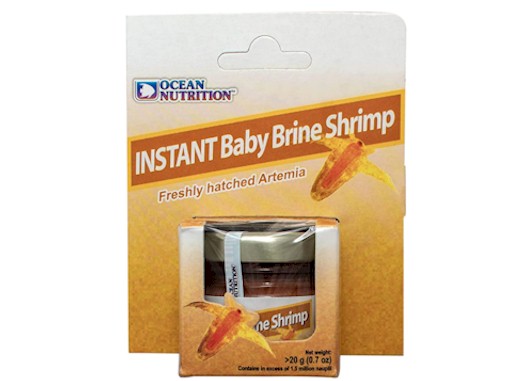
Guppy Fry Food Baby Brine Shrimp
As guppy fry grow older, you can reduce the frequency of their feedings and introduce more variety in their diet. You can also start feeding them the same food as their adult parents, but make sure to crush it up for them.
10. Weakened Genetics
Another factor that can cause guppy fry dying is weakened genetics. Guppies are known for their wide variety of colors and fin types, which are the result of selective breeding and interbreeding by hobbyists and sellers. However, this practice also reduces the genetic diversity and health of guppies, making them more prone to diseases, deformities, and defects.
Guppy fry that inherit weak genes from their parents may have a shorter lifespan, lower resistance to infections and parasites, lower fertility, or physical abnormalities such as bent spine or crooked tails. They may also have less vibrant colors or patterns than their parents.
To avoid weakened genetics in guppy fry, you need to choose healthy and strong parents from reputable breeders or sellers. You need to avoid inbreeding by mating closely related fish, such as siblings or cousins. You need to introduce new bloodlines every few generations by crossing different strains or varieties of guppies. You also need to cull any fry that show signs of poor health or quality.
11. Ammonia Spike
Another factor that can cause guppy fry dying is ammonia spike. Ammonia is a toxic chemical that is produced by the breakdown of fish waste, uneaten food, and decaying plants in the water. Ammonia can damage the gills, skin, and organs of fish, causing stress, disease, and death.
Guppy fry are more sensitive to ammonia than adult guppies because they have a larger surface area to volume ratio and a weaker immune system. Even low levels of ammonia can harm them. High levels of ammonia can kill them within hours.
To prevent ammonia spike in guppy fry tank, you need to perform regular water changes, use a filter, and avoid overfeeding your fish. You also need to cycle your tank before adding any fish, which means establishing a colony of beneficial bacteria that can convert ammonia into nitrite and nitrate, which are less harmful. You should also test your water regularly with a test kit to monitor the ammonia level.
How to prevent my guppy fry from dying?
Guppy fry are baby guppies that are born live and need special care to survive and grow. Guppy fry are often eaten by their parents or other fish in the tank, so it is important to provide them with a safe and suitable environment. Here are some solutions that can help you prevent your guppy fry from dying:
1. Keep your guppy fry thriving by separating them from their parents!
This is the best way to ensure that the fry are not eaten by the adults or other fish. You can use a breeding tank or a breeding box to isolate the pregnant female guppy before she gives birth, and then remove her after she delivers. Alternatively, you can transfer the fry to a separate tank after they are born.
2. Say goodbye to dying guppy fry: Tips for stable water conditions
Guppy fry are very sensitive to water quality and temperature, so it is essential to keep their tank clean and well-maintained. You should perform regular water changes of 20-30% once a week, and use a water conditioner to neutralize any chlorine or chloramine in the water. You should also monitor the pH, ammonia, nitrite, and nitrate levels of the water and keep them within safe ranges. The ideal pH for guppy fry is between 6.8 and 7.8.
3. The secret to healthy guppy fry? Feed them live food 5-6 times a day
Guppy fry have very small mouths but a huge appetite, so they need high-quality, protein-rich foods that are easy to digest. Live foods such as baby brine shrimp, micro worms, and vinegar eels are ideal for guppy fry. You can also feed them crushed flakes or pellets that are specially formulated for fry. You should feed them small amounts at a time, and remove any uneaten food after 15 minutes to prevent water pollution.
4. Hide-and-seek: How plants and decor can save your guppy fry
Guppy fry need places where they can hide from predators and feel secure. Live or artificial plants such as guppy grass, hornwort, java moss, or water lettuce can offer shelter and protection for the fry. You can also add rocks, driftwood, caves, or other structures that create hiding spaces for the fry. These decorations will also enhance the appearance of your tank and provide natural filtration for the water.
5. Don’t let your guppy fry suffocate! Avoid overcrowding in their tank
Guppy fry need enough space to swim around and grow properly. A 10-gallon tank is a good starting point for a small number of fry. However, if you plan on breeding multiple batches of fry, you should invest in a larger tank to accommodate their growth. You should also avoid overstocking your tank with too many fish, as this can lead to stress, disease, and aggression among your fish.
6. Breathe easy: Keep your guppy fry healthy with proper aeration
Guppy fry need oxygenated water to breathe and thrive. An air stone is a device that creates bubbles in the water and increases oxygen levels3. You should use a delicate air stone that does not create too much current or turbulence in the water, as this can stress or injure your fry. You should also provide adequate lighting for your tank by using an aquarium light or placing your tank near a window. Lighting helps regulate the biological clock of your fish and stimulates their growth. You should illuminate your tank for about eight hours a day, but avoid direct sunlight as this can cause algae growth and temperature fluctuations.
7. Keep it cozy: Optimal temperature range for guppy fry survival
Guppy fry require warm water with a consistent temperature between 78-82°F2. Any fluctuations in temperature can have a significant impact on their growth and health. To maintain a stable temperature, invest in a reliable aquarium heater and thermometer. You should also avoid placing your tank near sources of heat or cold such as radiators or air conditioners.
8. Oxygen is key: Ensure your guppy fry get enough with an air pump
Guppy fry need oxygenated water to breathe and thrive. An air pump is a device that pumps air into the water through tubing and an air stone. An air pump helps increase oxygen levels in the water and create bubbles that make your tank more lively. You should choose an air pump that is suitable for your tank size and adjust it according to your preference.
9. Keep Your Guppy Fry Alive: Essential Tank Maintenance Tips
Guppy fry are very susceptible to diseases and infections caused by poor water quality. Therefore, it is important to keep their tank clean and free of any organic matter that can decompose and pollute the water. You should use a gravel vacuum or a siphon to remove any dead plants, debris, and waste from the bottom of the tank. You should also use a filter to remove any suspended particles and toxins from the water. You should choose a filter that is gentle and does not create too much current or suction in the water.
These are some of the solutions that can help you prevent your guppy fry from dying. By following these tips, you can provide your guppy fry with a safe and suitable environment that supports their growth and development. Guppy fry are delicate and fragile, but they are also resilient and adaptable. With proper care and attention, guppy fry can grow into healthy adult fish and bring joy to any aquarium.
How Many Guppy Fry Will Survive?
The answer to this question depends on many factors, such as the breeding environment, the water quality, the feeding routine, the predators, and the diseases. Generally, female guppies give birth to about 100-150 fry per batch, and up to 20-25% of them can survive in a main tank with plenty of hiding places. However, this survival rate can be increased to 75-80% if the fry are separated from the adults and kept in a separate breeding tank with optimal conditions.

